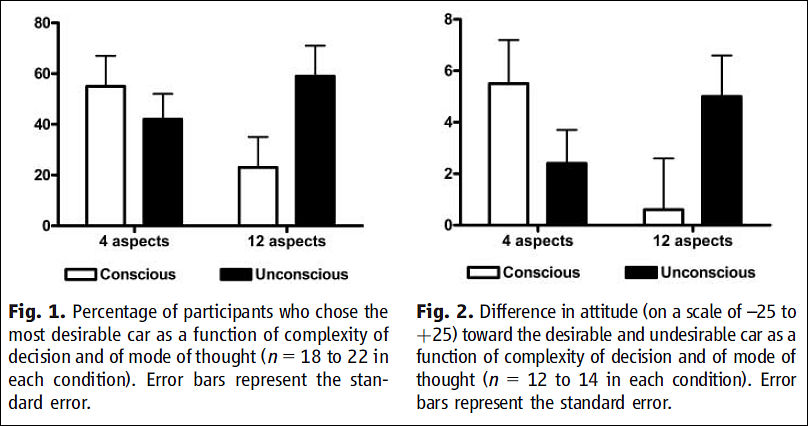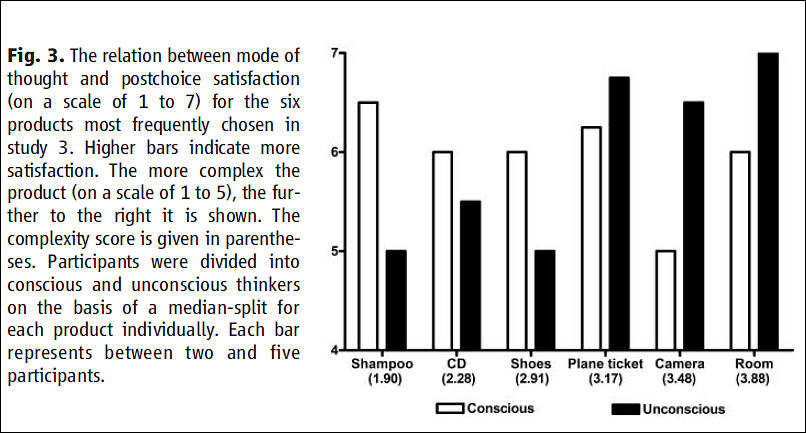
Please, support PV!
It allows to keep PV going, with more focus towards AI, but keeping be one of the few truly independent places.
It allows to keep PV going, with more focus towards AI, but keeping be one of the few truly independent places.
Choosing your next camera: Logic and emotions
-
Common knowledge holds that thorough conscious thought leads to good
decisions and satisfactory choices.
Whether purchasing a new car, a desktop computer, or a pair of shoes, people generally
believe that serious conscious deliberation increases the probability that they will make the
right choice. This idea applies especially to choices between products that are complex,
multifaceted, and expensive. Whereas most people are willing to buy a new set of towels
without much thought, they are unlikely to buy a new car or outfit a new kitchen without
deliberation.
A second pervasive idea is that the quality of a choice benefits from sleeping on it.
Rather than (or in addition to) thinking consciously, people usually feel that unconscious
thought is useful for making sound decisions.

Ap Dijksterhuis, «On Making the Right Choice: The Deliberation-Without-Attention Effect»
Read the rest at: http://www.unconsciouslab.com/publications/Dijksterhuis%20Bos%20Nordgren%20Van%20Baaren%20-%20The%20deliberation%20without%20attention%20effect.pdf

 choose.jpg808 x 426 - 87K
choose.jpg808 x 426 - 87K
 choose1.jpg806 x 433 - 96K
choose1.jpg806 x 433 - 96K -
Interesting. But since they measured the 'correctness' of the choice being by measuring postchoice satisfaction I think this says more about the nature of regret, and how we might 'beat ourselves up' over a wrong choice than anything else. Perhaps, if you've consciously evaluated criteria for a choice, you are more likely to notice negative reasons why you shouldn't had picked it? I think there's a lot of stuff going on here!
I wonder what would happen if you repeated this with choices where there was objectively a right or wrong answer (rather than subjective).
Start New Topic


Howdy, Stranger!
It looks like you're new here. If you want to get involved, click one of these buttons!
Categories
- Topics List23,992
- Blog5,725
- General and News1,354
- Hacks and Patches1,153
- ↳ Top Settings33
- ↳ Beginners256
- ↳ Archives402
- ↳ Hacks News and Development56
- Cameras2,367
- ↳ Panasonic995
- ↳ Canon118
- ↳ Sony156
- ↳ Nikon96
- ↳ Pentax and Samsung70
- ↳ Olympus and Fujifilm101
- ↳ Compacts and Camcorders300
- ↳ Smartphones for video97
- ↳ Pro Video Cameras191
- ↳ BlackMagic and other raw cameras116
- Skill1,960
- ↳ Business and distribution66
- ↳ Preparation, scripts and legal38
- ↳ Art149
- ↳ Import, Convert, Exporting291
- ↳ Editors191
- ↳ Effects and stunts115
- ↳ Color grading197
- ↳ Sound and Music280
- ↳ Lighting96
- ↳ Software and storage tips266
- Gear5,420
- ↳ Filters, Adapters, Matte boxes344
- ↳ Lenses1,582
- ↳ Follow focus and gears93
- ↳ Sound499
- ↳ Lighting gear314
- ↳ Camera movement230
- ↳ Gimbals and copters302
- ↳ Rigs and related stuff273
- ↳ Power solutions83
- ↳ Monitors and viewfinders340
- ↳ Tripods and fluid heads139
- ↳ Storage286
- ↳ Computers and studio gear560
- ↳ VR and 3D248
- Showcase1,859
- Marketplace2,834
- Offtopic1,320




